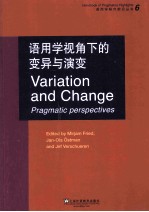图书介绍
语用学视角下的变异与演变PDF|Epub|txt|kindle电子书版本网盘下载

- Mirjam Fried,Jan-Ola Ostman,Jef Verschueren编 著
- 出版社: 上海:上海外语教育出版社
- ISBN:9787544636780
- 出版时间:2014
- 标注页数:275页
- 文件大小:55MB
- 文件页数:300页
- 主题词:语用学-研究-英文
PDF下载
下载说明
语用学视角下的变异与演变PDF格式电子书版下载
下载的文件为RAR压缩包。需要使用解压软件进行解压得到PDF格式图书。建议使用BT下载工具Free Download Manager进行下载,简称FDM(免费,没有广告,支持多平台)。本站资源全部打包为BT种子。所以需要使用专业的BT下载软件进行下载。如BitComet qBittorrent uTorrent等BT下载工具。迅雷目前由于本站不是热门资源。不推荐使用!后期资源热门了。安装了迅雷也可以迅雷进行下载!
(文件页数 要大于 标注页数,上中下等多册电子书除外)
注意:本站所有压缩包均有解压码: 点击下载压缩包解压工具
图书目录
Introduction:From instances of change to explanations of change&Mirjam Fried1
1.Approaches to variation and change2
2.Diachronic analysis and'pathways'of change5
3.Intra-lingual variation8
4.Cross-language variation 1o14
5.Summary and outlook14
Borrowing&Jeanine Treffers-Daller17
1.Introduction17
2.Short historical overview18
3.Definitions of borrowing: Terminological issues19
4.Different types/classifications of borrowing21
5.The integration of borrowings23
6.Constraints25
7.Quantitative approaches29
8.Psycholinguistic approaches30
Contact linguistics&Michael Meeuwis ? Jan-Ola ?stman36
1.Introduction36
2.Contact in relation to classificatory bases in linguistics36
3.Contact and location37
4.Direction of interference38
5.Indirect influence in language contact42
6.Contact as process:Towards pragmatics42
Creoles and creolization&Salikoko Mufwene46
Dialect&Ronald Macaulay61
1.Introduction61
2.Other labels62
2.1 Variety62
2.2 Lect63
2.3 Vernacular63
2.4 Social dialects64
3.Dialects as local forms of speech64
4.Some examples of dialect studies67
5.Some recent developments in the U.S.68
Dialectology&Georges De Schutter73
1.Definition73
2.An outline of history73
3.Aims of the investigation75
3.1 The impact of history on the origin and evolution of languages76
3.2 Linguistic reconstruction76
3.3 The study of universals of language,especially implicational scales77
3.4 Sociopragmatic and attitudinal aspects77
3.5 Communicative aspects78
4.Dialect atlases79
Evolutionary pragmatics&Wolfgang Wildgen81
1.Pragmaticism,pragmatics,adaptation and the evolution of language81
2.Sign-functions and their evolutionary significance83
2.1 The triad of sign functions83
2.2 The evolutionary interpretation of the triad of functions84
2.3 Selective value of communication and symbolic behavior86
3.Can the pragmatics of tool production and tool-use tell us something about the origin of language?87
3.1 Instrumentality in higher mammals and man88
3.2 Is tool-making a pragmatic source of propositional semantics?91
3.3 Cro-Magnon life space and the pragmatic space of decorated caves93
4.From ecological to cultural pragmatics95
5.Conclusions96
Historical linguistics&Louis Goossens100
1.Introduction100
2.HL in pre-generative work100
3.HL and generative grammar103
4.New perspectives104
5.Explicit107
Historical pragmatics&Andreas H.Jucker110
1.Introduction110
2.Origins111
3.Data problems111
4.Topics113
4.1 Discourse markers113
4.2 Speech acts114
4.3 Politeness116
5.New perspectives118
Implicature and language change&Kate Kearns123
1.Introduction123
2.Analyses citing conversational principles124
3.Implicature and metaphor131
4.Implicature,metonymy and merger134
5.Inferences based on lexical concepts135
6.Summary139
Interlanguage pragmatics&Gabriele Kasper141
1.Definition and scope141
2.Pragmatic comprehension141
2.1 Comprehension of nonliteral utterances141
2.2 Assessment of politeness142
2.3 Sociopragmatic assessment142
3.Production of linguistic action143
4.Development of pragmatic competence144
4.1 Cross-sectional studies144
4.2 Longitudinal studies145
4.3 Theoretical accounts145
5.Pragmatic transfer146
5.1 Definition146
5.2 Positive transfer146
5.3 Negative transfer147
5.4 Transferability148
6.Communicative effect149
7.Pragmatic norms150
8.Language teaching151
9.Research methods152
10.Further reading153
Jargon&Luisa Martín Rojo155
1.Introduction155
2.Studies of delinquent jargon and the introduction of a 'value-giving measure'156
3.Interpretations of antilanguages and their functions160
3.1 Halliday: The concept of antilanguage160
3.2 Sociolinguistic functions of delinquent jargon162
4.Varieties of jargon165
5.Conclusions168
Language change&Raymond Hickey171
1.Introduction171
2.Issues in language change173
2.1 Internal and external factors173
2.2 Simplicity and symmetry174
2.3 Iconicity and indexicality174
2.4 Markedness and naturalness175
2.5 Telic changes and epiphenomena176
2.6 Mergers and distinctions177
2.7 Possible changes178
2.8 Unidirectionality of change178
2.9 Ebb and flow179
3.Change and levels of language180
3.1 Phonological change180
3.2 Morphological change181
3.3 Syntactic change182
4.The study of universal grammar183
4.1 The principles and parameters model184
5.Semantic change186
6.Pragmatic change187
7.Methodologies188
7.1 Comparative method189
7.2 Internal reconstruction190
7.3 Analogy190
8.Sociolinguistic investigations190
8.1 Data collection methods192
8.2 Genre variation and stylistics192
9.Pathways of change192
9.1 Long-term change:Grammaticalization192
9.2 Large-scale changes:The typological perspective193
10.Contact accounts194
11.Language areas(Sprachbünde)197
12.Conclusion198
Language contact&Yaron Matras203
1.Introduction203
2.Societal multilingualism203
3.The bilingual individual204
4.Language mixing in conversation205
5.Contact-induced language change207
6.Contact,typology and language classification210
7.Concluding remarks212
Reconstruction&Derek Nurse215
Register&Norbert Dittmar221
1.History of the term'register'221
2.Systematization of the term224
3.Perspectives228
3.1 Functional linguistics à la Ferguson229
3.2 Intercultural communication230
3.3 Linguistic pragmatics230
3.4 Variation linguistics231
Typology&Bernard Comrie234
Variational pragmatics&Klaus P.Schneider239
1.Introduction239
2.Pragmatic coordinates240
2.1 The scope of pragmatics240
2.2 The place in pragmatics241
2.3 Levels of pragmatic analysis244
3.Variational coordinates246
3.1 Variation and identity246
3.2 Pragmatic variation249
3.3 What is a pragmatic variable?250
4.Methodological concerns252
4.1 Some basic principles252
4.2 Data253
5.Development254
5.1 History254
5.2 Research trends256
6.Perspectives260
Index268